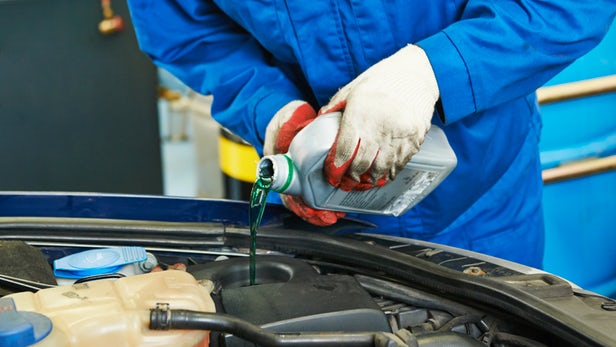Antifreeze Uses & Applications info | The Chemical Man
An antifreeze is an additive which lowers the freezing point of a water-based liquid and increases its boiling point. An antifreeze mixture is used to achieve freezing-point depression for cold environments and also achieves boiling-point elevation ("anti-boil") to allow higher coolant temperature. Freezing and boiling points are colligative properties of a solution, which depend on the concentration of the dissolved substance.
Because water has good properties as a coolant, water plus antifreeze is used in internal combustion engines and other heat transfer applications, such as HVAC chillers and solar water heaters. The purpose of antifreeze is to prevent a rigid enclosure from bursting due to expansion when water freezes. Commercially, both the additive (pure concentrate) and the mixture (diluted solution) are called antifreeze, depending on the context. Careful selection of an antifreeze can enable a wide temperature range in which the mixture remains in the liquid phase, which is critical to efficient heat transfer and the proper functioning of heat exchangers.
Other uses
The most common water-based antifreeze solutions used in electronics cooling are mixtures of water and either ethylene glycol (EGW) or propylene glycol (PGW). The use of ethylene glycol has a longer history, especially in the automotive industry. However, EGW solutions formulated for the automotive industry often have silicate based rust inhibitors that can coat and/or clog heat exchanger surfaces. Ethylene glycol is listed as a toxic chemical requiring care in handling and disposal.
Ethylene glycol has desirable thermal properties, including a high boiling point, low freezing point, stability over a wide range of temperatures, and high specific heat and thermal conductivity. It also has a low viscosity and, therefore, reduced pumping requirements. Although EGW has more desirable physical properties than PGW, the latter coolant is used in applications where toxicity might be a concern. PGW is generally recognized as safe for use in food or food processing applications, and can also be used in enclosed spaces.
Similar mixtures are commonly used in HVAC and industrial heating or cooling systems as a high-capacity heat transfer medium. Many formulations have corrosion inhibitors, and it is expected that these chemicals will be replenished (manually or under automatic control) to keep expensive piping and equipment from corroding
APPLICATIONS
Antifreeze Special is free from amine, phosphate and nitrite etc. And
uses as engine Antifreeze as well as coolant. This product is based
on ethylene glycol. It contains a corrosion inhibitor, salts of
organic acids and silicates (Si-OAT). It protects all metallic parts
against corrosion and deposits in the cooling system.
Benefit
The product protects all parts of cooling system from frost, oxidation
and overheating.
It has long-term protection against corrosion for all materials used
in the engine and radiator construction, such as cast iron, aluminium,
copper and solder alloys as well as a good compatibility with hoses,
seals or plastics.
It contains carefully selected amine, nitrite, boron and phosphate
free inhibitors and is therefore environmentally friendly.


Leave a comment